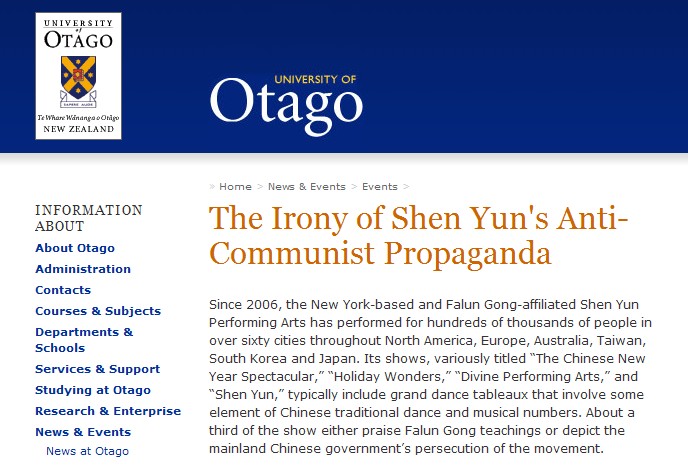Since 2006, the New York-based and Falun Gong-affiliated Shen Yun Performing Arts has performed for hundreds of thousands of people in over sixty cities throughout North America, Europe, Australia, Taiwan, South Korea and Japan. Its shows, variously titled “The Chinese New Year Spectacular,” “Holiday Wonders,” “Divine Performing Arts,” and “Shen Yun,” typically include grand dance tableaux that involve some element of Chinese traditional dance and musical numbers. About a third of the show either praise Falun Gong teachings or depict the mainland Chinese government’s persecution of the movement.
Newspapers and blogs have extensively covered the intense controversy generated by the religious/political aspects of the show. In this paper, I focus on a less-discussed issue: namely the relationship of the show to Chinese traditional culture.
This is an important issue because Chinese heritage and its revival is the basis of Shen Yun Performing Arts’s mission and advertising campaign. Its website states, “Over the past 60-plus years under Chinese Communist Party rule—and especially during campaigns such as the Cultural Revolution—much of China’s traditional culture has been destroyed.” It moreover reports that the company is formed by talented artists in the Chinese diaspora “with the explicit mission of reviving traditional Chinese culture”
Shen Yun’s shows reveal that, for this company, the essence of Chinese heritage is not static, and is open to modernization and Westernization. While Western instruments often provide harmonies for melodies played on Chinese instruments, the large dance numbers reveal the influence of Hollywood and Disney musicals. Ultimately, I argue that, ironically, this blending of Western and Chinese traditions recalls not so much traditional Chinese culture, but rather the most iconic genre of Shen Yun’s nemesis: the Chinese Communist Party’s Revolutionary Operas.
About the author
Eric Hung is Associate Professor of Music History at Westminster Choir College of Rider University in Princeton, NJ. His research focuses on Asian American music, film music and experimental music. Eric is Executive Director Designate and a member of Gamelan Dharma Swara, the Balinese music-and-dance ensemble based at the Indonesian Consulate in New York City. He is also an active pianist and koto player. Eric received an ARCT in piano performance from the Royal Conservatory of Music in Toronto, a BA in social studies and music from Wesleyan University, and a PhD in musicology from Stanford University. He has also taught at Minnesota State University Moorhead and the University of Montana. In Spring 2011, he was a Visiting Fellow at the University of Otago in New Zealand.

Original text from: http://www.otago.ac.nzews/events/otago017296.html